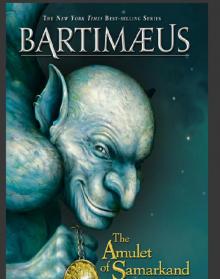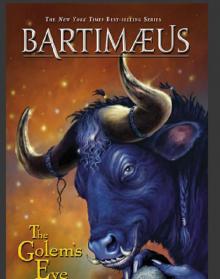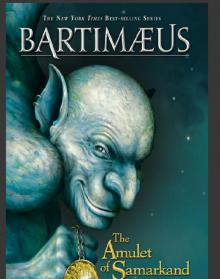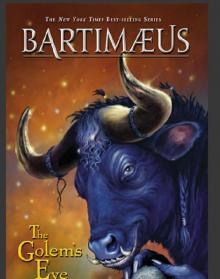- Home
- Jonathan Stroud
Ptolemy's Gate Page 4
Ptolemy's Gate Read online
Page 4
I proposed this theory in my usual gentle way, but Mandrake was unwilling to listen to my taunts. He was a worried man.9 The American campaigns were vastly expensive, the British supply lines overstretched. With the magicians’ attention diverted, other parts of the Empire had become troublesome. Foreign spies infested London like maggots in an apple. The commoners were volatile. To counter all this, Mandrake worked like a slave.
Well, not literally like a slave. That was my job. And a pretty thankless one it was too. Back at Internal Affairs, some of the assignments had been almost worthy of my talents. I’d intercepted enemy messages and deciphered them, given out false reports, trailed enemy spirits, duffed a few of them up, etc. It was simple, satisfying work—I got a craftsman’s pleasure from it. In addition, I helped Mandrake and the police in the search for two fugitives from the golem affair. The first of these was a certain mysterious mercenary (distinguishing features: big beard, grim expression, swanky black clothes, general invulnerability to Infernos/Detonations/pretty much everything else). He’d last been seen far away in Prague, and predictably enough we never got a whiff of him. The second was an even more nebulous character, whom no one had even set eyes on. He apparently went by the name of Hopkins, and claimed to be a scholar. He was generally suspected of masterminding the golem plot, and I’d heard he’d been involved with the Resistance too. But he might as well have been a ghost or shadow for all the substance we could pin down. We found a spidery signature in an admissions book at an old library that might have been his.That was all. The trail, such as it was, went cold.
Then Mandrake became Information Minister and I was soon engaged in more depressing work, viz. pasting up adverts on 1,000 billboards across London; distributing pamphlets to 25,000 homes across ditto; corralling selected animals for public holiday “entertainments”;10 supervising food, drink, and “hygiene” for same; flying back and forth across the capital for hours on end trailing pro-war banners. Now, call me picky, but I’d argue that when you think of a 5,000-year-old djinni, the scourge of civilizations and confidante of kings, certain things come to mind—swashbuckling espionage, perhaps, or valiant battles, thrilling escapes and general multipurpose excitement. What you don’t readily think of is that same noble djinni being forced to prepare giant vats of chili con carne for festival days, or struggling on street corners with bill-posters and pots of glue.
Especially without being allowed to return home. Soon my periods of respite in the Other Place became so fleeting I practically got whiplash traveling there and back. Then, one day, Mandrake ceased dismissing me altogether, and that was it. I was trapped on Earth.
Over the next two years I grew steadily weaker, and just when I was hitting rock bottom, scarcely able to lift a poster brush, the wretched boy began sending me out on more dangerous missions again—fighting bands of enemy djinn that Britain’s many enemies were using to stir up trouble.
In the past I’d have had a quiet word with Mandrake, expressing my disapproval with succinct directness. But my privileged access to him was no more. He’d taken to summoning me along with a host of other slaves, giving orders en masse and sending us off like a pack of dogs. Such multiple summoning is a difficult business, requiring great mental strength on the part of the magician, but Mandrake did it daily without apparent effort, talking quietly with his assistant or even flicking through a newspaper while we stood and sweated in our circles.
I did my best to get to him. Instead of using a monstrous guise like my fellow slaves (Ascobol’s cyclops and Cormocodran’s boar-headed behemoth were typical), I took to wearing the semblance of Kitty Jones, the Resistance girl Mandrake had persecuted years before. Her assumed death still weighed on his conscience: I knew this because he always reacted to my echo of her face with a reddening of his own. He’d get all angry and sheepish, assertive and embarrassed at the same time. Didn’t make him treat me any better, mind.
Well, I’d had about as much as I could stand from Mandrake. It was time to have it out with him. By refusing to go back with the imp, I obliged the magician to recall me officially, which would doubtless hurt, but was at least likely to mean he gave me the benefit of his attention for five minutes.
The imp had been gone for hours. In the past I’d have got a swift response from my master, but the delay was typical of his new distractedness. I smoothed back Kitty Jones’s long dark hair and cast my eye around the little rural town. Several commoners had gathered around the ruined post office and were engaged in passionate debate; they resisted the efforts of a lone policeman to make them return to their homes. No doubt about it: the people were growing restless.
Which turned my thoughts to Kitty once again. Despite appearances to the contrary, she hadn’t died in battle with the golem three years before. Instead, after acting with unusual selflessness and bravery to save Mandrake’s worthless hide, she’d slipped quietly away. Our encounter had been brief but stimulating: her passionate opposition to injustice reminded me of someone else I’d known, a long time ago.
Part of me hoped Kitty had bought a one-way ticket to somewhere safe and distant and had set up a cafe on a beach or something, out of harm’s way. But deep down I knew she was still close by, working against the magicians. That knowledge rather pleased me, though she’d had no love for djinn.
Whatever she was doing, I hoped she was keeping out of trouble.
4
The demon saw Kitty the moment she moved. A wide mouth opened in the stubby, featureless head; double rows of teeth descended from above and rose from the lining of the jaw. It snipped its teeth together curiously, making a noise like a thousand scissors, slicing in unison. Folds of gray-green flesh shifted on either side of the skull, revealing two golden eyes that glinted as they turned on her.
Kitty did not repeat her mistake. She stood stock-still, barely six feet from the bent and snuffling head, and held her breath.
The demon scraped a foot experimentally against the floor, scoring five thick claw gashes in the tiles. It made a curious crooning noise deep in its throat. It was sizing her up, she knew it was, appraising her strength, debating whether to attack. In the final moments of crisis her brain took in many irrelevant details of its guise: the flecks of gray hair about the joints, the bright metal scales upon the torso, the hands with too many fingers and too few bones. Her own limbs shook; her hands twitched as if to encourage her to run, but she fought against her fear and beat it down.
Then a voice came: sweet and female, curiously inquiring. “Aren’t you going to run, my dear? I can only lope along on these club feet. Ah me, so slow! Try it. You never know—you might escape.” So gentle was the voice it took Kitty a moment to realize it came from the dreadful mouth. It was the demon that spoke. Numbly she shook her head.
The demon flexed six fingers in an incomprehensible gesture. “Then at least step toward me,” the sweet voice said. “It would save me the torture of hobbling over to you on these poor club feet of mine. Ah me, so sore! My essence flinches from the pull of your harsh, cruel earth.”
Again Kitty shook her head, slower this time. The demon sighed, bowing its head as if crushed and disappointed. “My dear, you have no courtesy. I wonder whether your essence would disagree with me if I ate you. I am a martyr to indigestion.…” The head rose; the eyes sparkled, the teeth snipped like a thousand scissors. “I will risk it.” Without pause the leg joints bent and sprang, the jaws opened, wide, wide, wide; the fingers clasped. Kitty fell back, screamed.
A wall of silver shards, thin as rapiers, rose from the floor, spearing the demon as it leaped; a flash, a shower of sparks—its body burst into lilac flames. It hovered in midair for a split second, twitched, emitted a single gout of smoke, then drifted softly to the floor, light as burning paper. A little voice whispered, sad, resentful: “Ah me …” Now it was nothing but a husk, which fell in upon itself and presently dwindled into ashes.
Kitty’s muscles were frozen in a rictus of terror; with a grim effort, she managed to close h
er mouth and blink, once, twice. She ran a trembling hand through her hair.
“Great heavens,” her master said from the pentacle on the opposite side of the room. “I didn’t expect that. But the stupidity of these creatures is boundless. Sweep away the mess, dear Lizzie, and we can discuss the procedure. You must be very proud of your success.”
Dumbly, eyes still staring, Kitty managed the faintest of nods. She stepped stiff-legged from the circle and went to fetch the broom.
* * *
“Well, you’re a clever girl and no mistake.” Her master was sitting on the sofa nearest the window, sipping from a china cup. “And you make good tea too, which is a blessing on a day like this one.” Rain battered the windowpanes and gusted haphazardly across the street. The wind whined in the passages of the house. Kitty drew her feet up out of the draft skirling across the floor and took a swig of strong brown tea from her mug.
The old man wiped his mouth with the back of his hand. “Yes, a very satisfactory summons. Not bad at all. And most interesting for me—who’d have thought the true form of a succubus looked like that? Gracious! Now, Lizzie, did you notice that you slightly mispronounced the Restraining Syllable, right at the end? Not enough to break the safety wall, but the creature was emboldened, thought it would try its luck. Fortunately, everything else you did was perfect.”
Kitty was still shaking. She sank back among the cushions of the ancient sofa. “If I’d … made any other mistakes, sir,” she said haltingly, “what would have—?”
“Oh, gracious—I wouldn’t worry your head about that. You didn’t, and that’s what counts. Have a chocolate digestive.” He indicated the plate between them. “Settles the stomach, I find.”
She took a biscuit, dunked it in her tea. “But why did it attack me?” she said, frowning. “Surely it must have been able to tell that the pentacle’s defenses would come into force.”
Her master chuckled. “Who can say? Perhaps it hoped you would flinch out of the circle as it leaped: that would have instantly destroyed its prison and allowed it to devour you. Notice that it had already tried two childish stratagems to persuade you to leave the pentacle. Hum, it was not a sophisticated djinni. But perhaps it had grown tired of bondage; perhaps it simply wished to die.” He eyed the dregs at the bottom of his teacup musingly. “Who can tell? We understand so little about demons, about what makes them tick. They are hard to fathom. Is there any more in the pot?”
Kitty inspected it. “Nope. I’ll make some more.”
“If you would, dear Lizzie, if you would. You might pass me that copy of Trismegistus on your way out. He has some interesting notes on succubi, if I recall.”
Chill air bit into her as she entered the passage and stomped down to the kitchen. There, leaning close to the blue gas flame hissing beneath the kettle, her self-control finally slackened. She began to tremble—proper heavy body-shuddering shakes that made her grasp the work surface for support.
She closed her eyes. The demon’s open jaws plummeted toward her. She opened them again at speed.
A paper bag of fruit sat beside the sink. Mechanically she took an apple and ate it, gulping it down desperately in great rough chunks. She took another, and finished it more slowly, staring sightlessly at the wall.
Her trembling subsided. The kettle whistled. Jakob was right, she thought, rinsing her mug under an icy stream of water. I’m an idiot. Nobody but a fool would do this. Nobody but a fool.
But a fool could still be lucky. And so far, for three long years, her luck had held.
Since the day when her death had been reported and accepted, and the authorities had sealed their file on her with a blob of hot black wax, Kitty had never once left London. No matter that her good friend Jakob Hyrnek, safe with relatives in Bruges and working as a jeweler, sent her imploring epistles weekly, begging her to come and live with him. No matter that his family urged her, during their secretive, irregular meetings, to leave the dangers of the city and start her life afresh. No matter that her common sense cried out to her that she could do nothing useful on her own. Kitty was undeterred. In London she remained.
Stubborn she still might be, but her old recklessness was now swathed with caution. Everything from her appearance to her daily routine was carefully judged to avoid arousing the suspicions of the authorities. This was essential, since for Kitty Jones existence was itself a crime. To conceal herself from the eyes of those few who knew her, she had cropped her dark hair short and wore it in a bob beneath her cap. She kept tight rein on her mobile features, no matter what the provocation; she did her best to be dull-eyed, stone-faced, nothing but a numeral in a crowd.
Though perhaps a little thinner in the face from overwork and lack of inessential food, though perhaps a little lined around the eyes, she still possessed the same mercurial energies that had borne her into the Resistance and out again, alive. They supported her in pursuit of a certain ambitious project, and in the maintenance of no fewer than two false identities.
She had taken lodgings on the third floor of a dilapidated West London town house, in a street near the munitions factories. Above and below her bedsit were several other rooms that had been crammed by the enterprising landlord into the shell of the old building. Each was occupied, but save for the caretaker, a diminutive man who lived in the basement, Kitty had not spoken to any of the tenants. She passed them on the stairs sometimes: men and women, old and young, all living lives of isolation and anonymity She was satisfied with this: she both liked and needed the solitude the house afforded her.
The contents of her room were few. A small white cooker, a fridge, a cupboard, and, in a corner, behind a dangling sheet, a sink and toilet. Below the window, which looked out over a tangle of walls and unkempt yards to the house backs opposite, sat a confusion of jumbled sheets and pillows: Kitty’s bed. Beside this were neatly stacked her worldly possessions: clothes, tins of food, newspapers, recent pamphlets about the war. Her most precious items were variously hidden beneath the mattress (a silver throwing disc wrapped in a handkerchief), in the cistern of her toilet (a sealed plastic bag containing the documents she needed to maintain her new identities), and at the bottom of her laundry bag (several thick books bound in leather).
Being of practical disposition, Kitty did not regard her room with great affection. It was a place to sleep and little more. She did not spend much time in it. Nevertheless, it was her home, and she had lived there for three years.
The name she had given the landlord was Clara Bell. This coincided with the documents that she carried around with her most often—the stamped identity card and the residence, health and education papers that mapped out her recent past. They had been forged for her with great skill by old Mr. Hyrnek, Jakob’s father, who had also created a separate set for her under the name of Lizzie Temple. She did not have any papers with her real name. Only at night, when she lay back in the bed with curtain drawn and the single light switched off, did she become Kitty Jones once more. It was an identity swathed in darkness and dreams.
* * *
For some months following Jakob’s departure, Clara Bell had worked at the Hyrneks’ printing factory, delivering newly bound books and earning a basic wage. This did not last long—Kitty was reluctant to imperil her friends by too close an association, and had quickly taken on an evening job at a pub beside the river. By then, however, her humdrum errands had provided her with a most unusual opportunity.
One morning Kitty had been summoned to Mr. Hyrnek’s office and handed a package to deliver. It was heavy, smelled of glue and leather, and was methodically wrapped in string. It was labeled: MR. H. BUTTON, MAGICIAN.
Kitty inspected the address. “Earls Court,” she said. “Not many magicians there.”
Mr. Hyrnek was attending to his pipe with a blackened penknife and piece of cloth. “Among our beloved rulers,” he said, flicking out a fragment of burned soot, “this Button is regarded as an incurable eccentric. He’s skilled enough, by all accounts, but has never at
tempted to rise through the political ranks. Used to work as a librarian at the London Library, until he had an accident. Lost a leg. Now just reads, collects books where he can, writes a bit. Told me once that he was interested in knowledge for its own sake. Hence no money. Hence Earls Court. Take it along, will you?”
Kitty had done so, and found Mr. Button’s house in a region of gray-white villas, tall and heavy, with immense pillars supporting ostentatious porches above the doors. Once they had been occupied by the rich; now the district carried a melancholy aura of poverty and decay. Mr. Button lived at the end of a tree-lined cul-de-sac, in a house shrouded by dark laurels. Kitty had rung the bell and waited on a stained and dirty step.
No one answered; she noticed then that the door was hanging ajar.
She peered inside: a dilapidated hall, made narrow by stacks of books against the walls. She coughed uncertainly. “Hello?”
“Yes, yes, come in!” A muffled voice echoed faintly. “At speed, if you will. I am a little inconvenienced.”
Kitty hastened forward, and in a neighboring room, rendered indistinct by dust-caked curtains drawn across the windows, discovered a twitching boot protruding from beneath a colossal pile of fallen books. Exploring further, she came upon the head and neck of an elderly gentleman, vainly struggling to wriggle free. Without preamble, Kitty made a rapid excavation; in a few minutes Mr. Button was settled in a nearby chair, a little crumpled and very out of breath.
“Thank you, my dear. Would you mind passing me my stick? I was using it to extract a book, which I fear caused all the trouble.”
Kitty rescued a long ash stick from among the debris and handed it to the magician. He was a small and fragile man, bright-eyed, thin-faced, with a disordered mop of straight gray hair hanging low over his forehead. He wore a checked shirt without a tie, a patched green cardigan, and gray trousers, scuffed and stained. One trouser leg was missing; it had been folded over and sewn shut just below the torso.

 The Leap
The Leap Buried Fire
Buried Fire Heroes of the Valley
Heroes of the Valley The Empty Grave
The Empty Grave The Hollow Boy
The Hollow Boy The Last Siege
The Last Siege The Dagger in the Desk
The Dagger in the Desk The Amulet of Samarkand
The Amulet of Samarkand The Golem's Eye
The Golem's Eye The Screaming Staircase
The Screaming Staircase The Outlaws Scarlett and Browne
The Outlaws Scarlett and Browne The Ring of Solomon: A Bartimaeus Novel
The Ring of Solomon: A Bartimaeus Novel Lockwood & Co
Lockwood & Co Lockwood & Co: The Screaming Staircase
Lockwood & Co: The Screaming Staircase Bartimaeus: The Amulet of Samarkand
Bartimaeus: The Amulet of Samarkand The Amulet of Samarkand tbt-1
The Amulet of Samarkand tbt-1 Lockwood & Co.: The Creeping Shadow
Lockwood & Co.: The Creeping Shadow The Ring of Solomon
The Ring of Solomon Lockwood & Co. Book Three: The Hollow Boy
Lockwood & Co. Book Three: The Hollow Boy Bartimaeus: The Golem’s Eye
Bartimaeus: The Golem’s Eye